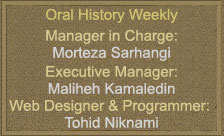| No. 267 | 4 September 2016 |
Ardor of Resistance by Mohammadreza FartukzadehMemories of the Revolutionary Ambiance of University of ShirazWhat was happening in cities during revolution? How involved were people in the resistance against Pahlavi regime? How was the situation in scientific-cultural institutions? We seek the answers to these questions by listening to the stories and memories of different people. Dr. Mohammadreza Fartukzadeh offers some information in his book “Ardor” on the events leading to the victory of the Islamic Revolution in Shiraz and Tehran. Since he was a student at the time, his stories involve students’ resistance against Pahlavi regime.A speech by Imam Moussa al-SadrThe speech of Imam Moussa al-Sadr was made in assembly of the Ulema and Clergymen on the night of Eid al-Adha in February 1972 in Hosseinia Emadzadeh, Esfahan. In this lecture, the reason of establishment of the Supreme Council for Lebanese Shiites has been expressed.Honorable life Secrets of a martyrPortrait of a Man in RevolutionA lot of people were deeply influenced by him. Attraction was one of his characteristics. He interested in fighting when he was fourteen, and experienced prison in the thirty-three years old, and prisoned for thirteen years. While he was working, he liked to effort in education. Education and fighting were being done together. He took his last test in a situation which he was pursued by SAVAK. He was in relationship with the party "Devotees of Islam" and tried to attend in weekly meetings of Mosque named Sheikh Ali at street. All of the mentioned points were just several features of martyr Hajj Mehdi Iraqi. He was president of the guild Fakhar. It and fighting against the Pahlavi regime were an excuse to publish the book "Portrait of a Man in Revolution"Memoirs of Mohammad Majidi from resistance years against Saddam army, Part I10 days in front and 4 years of captivityDuring the sacred defense years, Mohammad Majidi went to the war fronts in order to take part in one of the phases of Karbala 5 Operation. But only ten days after his presence in the front, he was taken as captive by the Iraqi Bathists enemy forces and spent four years out of the best years of his life in the camps of Saddam army. In an interview with the website of Iranian Oral History, Majidi has spoken about his memoirs of the years of the Iraqi imposed war against Iran. Oral History Weekly Magazine Aims and Regulations
Oral History Weekly Magazine wishes to create a suitable place for thoughts and idea development; Its main field would be “Oral History” and subjects as telling & writing memoirs, writing diaries, travelogues, chronologies, and all other subfields of history which are presented in the form of news, articles, reports, notes, interviews and memoirs can be included. There is no limitation on the length of would-be-sent materials. Mentioning the name, academic background and email is necessary. Articles with complete references and bibliography are more credited and an abstract would quite helpful. Weekly is not about to publish any material consisting insults and libels about other people or anything that brings anxiety to public opinion. Weekly can edit and translate the received materials. The published articles and materials are only the writer’s ideas and Oral History Weekly Magazine has no responsibility about their content. |
 Air Raid to Al-Waleed (35) The Story of Demolishing Fighters and the Equipment in Al-Waleed Triple Military Bases Known as H-3 By: Brigadier General Ahmad Mehrnia Tehran, Sooreh Mehr Publications Company 2010 (Persian Version) Translated by: Zahra Hosseinian
Echoes of the operation of air raid to Al-Waleed The result of air raiding to the three bases of northern, eastern, and southern al-Waleed was destruction of more than 48 different types of aircrafts such as, Tu-22, Tu-16, MiG-23, Su-20 and other types of aircrafts and key equipment, plus several types of helicopters and some radar systems which had been deployed to Al-Waleed to avoid air strikes. The incident became the major news of media very soon and was considered at the farthest region around the world. The most important aspect of it was the state of traversing such a long route, given the available equipment and the heavy conditions of the time.    |
